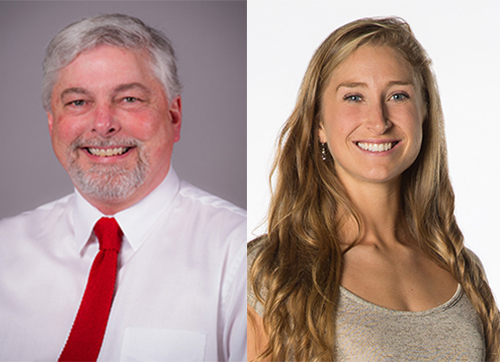When Jeff Bonacci came to the University of Arkansas to help establish a master's level athletic training education program, he envisioned a specific type of person to serve as medical director of the fledging program.
"I wanted someone with a really strong conviction for education," said Bonacci, a clinical assistant professor of kinesiology who coordinates the program. "I needed someone who would be invested in the program and who had strong connections in the medical community."
He found Dr. Al Gordon, who a dozen years later continues to serve in the position. Gordon acts as medical consultant on research that students conduct, lectures a couple of times a year, coordinates lectures by other physicians in the area and serves as medical liaison to help match students with physicians and other health-care providers they can shadow on the job.
It was in 2003 that the College of Education and Health Professions began offering the program, the first on the graduate level in the SEC. Gordon had been providing primary care for the Razorback athletic department since 1994.
"I think Jeff did a little background on me and learned I had been to graduate school (before medical school) and that I had taught for a while," Gordon said. "That appealed to him."
Bonacci said Gordon's involvement has been crucial to the success of the program, which reports a 100 percent pass rate on the first attempt for the past six years of graduates taking the national exam certifying athletic trainers.
Gordon earned his medical degree from the University of Arkansas for Medical Sciences in Little Rock, but between earning a master's degree from the University of Central Arkansas in Conway and medical school, he taught courses such as biology and human anatomy and physiology at the University of Arkansas at Little Rock.
An Arkansas native, his bachelor's degree is from Hendrix College in Conway. He originally intended to teach biology on the college level until friends talked him into taking an emergency medical technician course, and he worked as a certified EMT to pay his way through graduate school.
"Being medical director of the graduate athletic training education program lets me scratch my itch to teach," Gordon said. "One of the neatest things of being with the program since the get-go is watching it form and develop. It has been thrilling."
Working with the master's students helps him keep his skills and interests sharp, he said.
"It's amazing how eager they are to learn," Gordon said. "They want to be in the patient room with me. I want to pass on the right information. I want to be accurate. It makes me stay on my toes."
The clinical rotations with physicians and athletic teams give students real-world experience that is particularly vital in the medical profession, he said. They work side-by-side with certified athletic trainers and understand the teamwork necessary to take care of athletes.
"They are not only exposed to the real-time events with athletic trainers, they are exposed to how athletic trainers work with physicians," he said. "That is a key part of this program."
Gordon had wanted to support the program in another way, by creating a scholarship for one of the students, and that goal became reality this year.
"All along, the concept was important to me of giving back," he said. "It was important to my parents to give back. I could see that scholarship support was important to these students. This graduate program is where my heart is."
Meghan Barrington of Pullman, Washington, is the first recipient of the Dr. A.Y. Gordon Jr. Award in Athletic Training. She is the daughter of George and Suzanne Barrington. She earned a bachelor's degree in physiology from the University of Washington.
A faculty committee chose the recipient, but Gordon said Barrington reminds him of himself.
"When I listen to her talk about her goals and what she likes as far as the education process, it sounded hauntingly similar to me," Gordon said. "It's a pleasant problem we share – everything she gets into she likes. I think that's why I chose primary care as a specialty, because it's broader than other areas."
Barrington also has the personality, leadership qualities and academic abilities to be successful, Gordon said.
"I'm very glad she benefits from this," he said. "She deserves it."
Gordon also gives a lot of credit to the faculty over the years who have made the athletic training education program successful.
"That group is always really easy to work with and fun to work with," he said. "They are top notch, and we are privileged to have them."
Contacts
Heidi Wells, director of communications
College of Education and Health Professions
479-575-3138,
